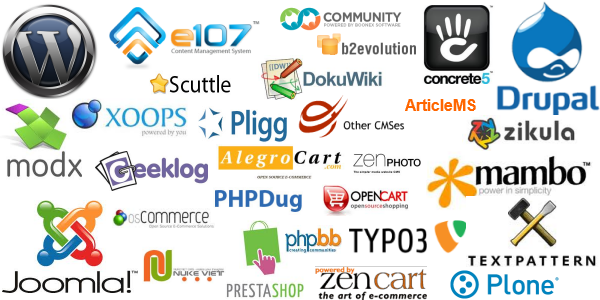Understanding the Content Management System landscape in 2018.
There are literally thousands of Content Management Systems (CMS) out there, and if you came into it as an amateur and tried to pick one, you'd get hopelessly lost in the first five minutes. In order to make this process a little easier on you, and / or to help you understand whether the CMS you're being recommended is right for you, I've broken the thousands of choices down to a few basic categories which will enable you to make a much more educated decision.
The "big three" - Wordpress, Drupal and Joomla
For better or worse, these three CMSes have *BY FAR* the biggest share of the market. There are many reasons for this, some of them qualitative, some of them historical, but to you, the business owner, what you need to know is this: These three are all an extremely safe pick. If your developers are going to use one of these, you can't go too far wrong. All three of these platforms have a tremendous amount of support available in the marketplace, which means you've always got someone to turn to, and because these platforms are so widely used, they have the most modules available, they have the best 3rd party support, and so on.
Every single other Open Source CMS
While it is doubtless that there are technically better CMSes than the big three, we can categorize them all together in this enormous lump because the technology doesn't really count for a lot for you as a business owner. Using any open source CMS other than the big three is risky in that you may struggle to find developers who are skilled with it, you may run into problems where you don't have the community support available to solve them, and you may find that features the big three all provide just aren't available for your CMS. On the upside, there may be a very specific reason for using one of these platforms, e.g. it is exceptionally well suited to your specific requirements. I'm not saying you shoudn't go with with a platform that isn't one of the big three, but just be aware that you may struggle for support at some time in the future.
Custom CMSes
These are less common these days, but you will still run into agencies that offer their own custom CMS that they wrote internally. Avoid them at all costs. You will be locked in to that vendor forever, and you will become frustratingly familiar with the phrase "sorry, the system doesn't support that". Just don't do it. You will regret it.
Commercial CMSes
Last but not least, we have the commercial CMSes, the ones that charge either an up front fee for the software, an ongoing subscription fee, or sometimes both. These CMSes are a mixed bag, some of them are really powerful, some of them are worthless, but here's what you should know: Because you're paying all this money to a commercial entity to support the platform, they tend to provide a lot of "boring" features that provide sometimes really benefits to business owners, but because they're not "fun", the open source developers can't be bothered working on them, e.g. a streamlined way of moving content from a staging site to a production site. That being said, none of the commercial CMSes will magically solve ALL your problems, you're still going to have to do a bunch of design and development to get them to do what you want, and that can often be much more expensive than what you'd get with one of the big three, because there's far fewer qualified developers available to work on these platforms, and they all charge a premium. All in all, the commercial CMSes really are aimed at the big end of town, and if that's you then you probably already understand this. If you're a small business, and you're trying to decide between a modestly cheap commercial CMS (sub $5k), and one of the big three, then just go with the big three. You won't get any benefit from spending that money.
So in summary, Drupal, Wordpress or Joomla are all a safe pick, the rest of them have their ups and downs, and try not to get suckered in to the commercial CMS trap. I love talking about this kind of stuff, as strange as that may sound, so feel free to hit me up if you ever have any questions!
Assembler is a web design agency based in Perth, Western Australia. This blog is intended to be an informal, behind the scenes look into the web design and development industry. If you like our content, please follow us on LinkedIn or Facebook!
